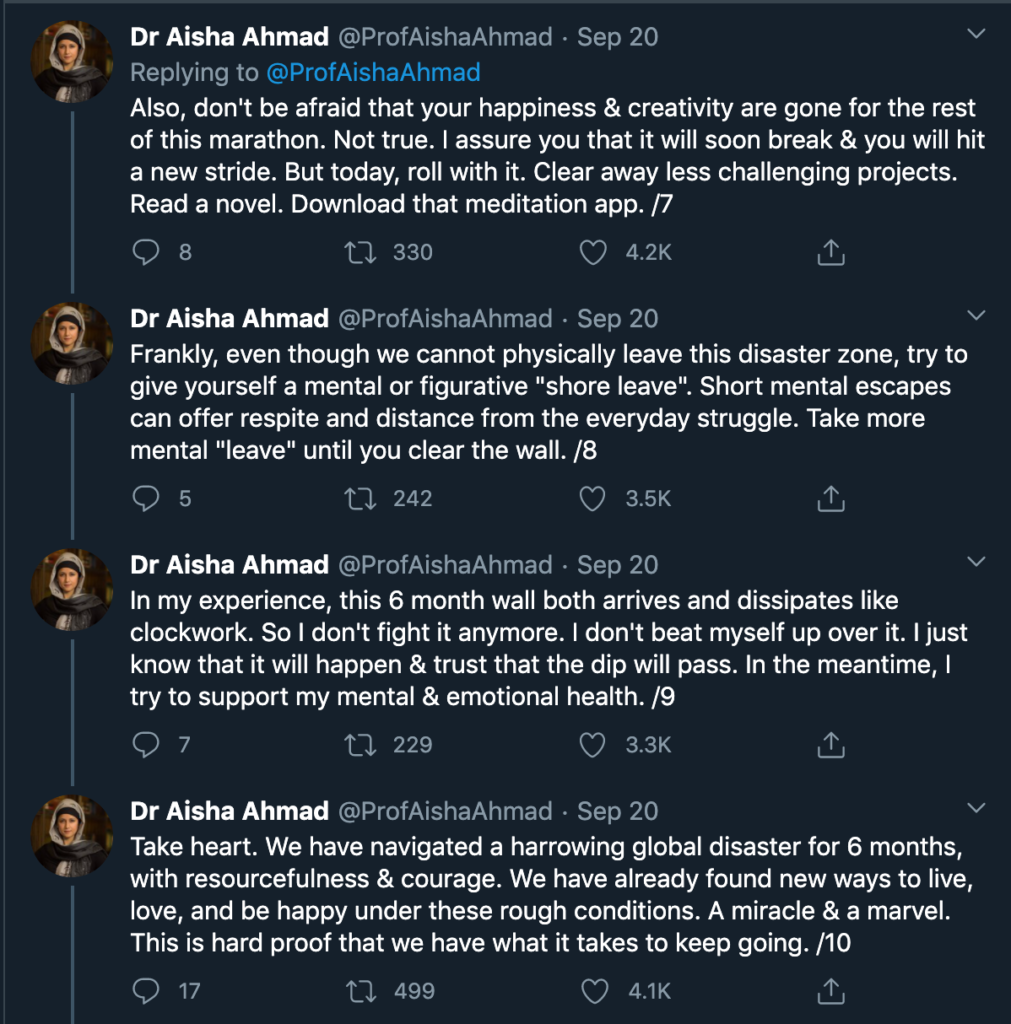Low energy. A lack of creativity that partly explains why I haven’t written in over a month. A deepening sense of dread. I’ve spent weeks trying to put a name or definition to the feelings and fatigue.
I know the cause, and I know that I’m no special case. A lot of people are experiencing the same things, and the whys are many: We’ve had to hold our mental functionality together amid an unending pandemic, a breakdown of public discourse, civil unrest and now a looming presidential election where an unclear result and constitutional crisis are all but certain.
I’ve finally found the proper label, courtesy of Dr. Aisha Ahmad. More importantly, she has put forth a remedy to help us move forward.
Mood Music:
Dr. Ahmad, associate professor of political science at the University of Toronto, wrote a recent Twitter thread about the six-month wall she has experienced when working for prolonged periods in disaster zones and how, when you hit that wall, it seems like the darkness is permanent, that things will never get better.
The desire to “make it stop” and “get away” is “intense” and our impulse is to try and ram through the period of uncertainty, trying to be as creative, disciplined and hopeful as we may be the rest of the time. She has learned to stop doing that, to give in to the lack of creativity and drive and take a “mental shore leave.”

I’m certainly experiencing this wall. I find it harder to write (this is my first post in a month), and it’s getting harder to get out of bed in the morning. I’m finding it close to impossible to be patient with the unending social media screeds from the left and right political extremes.
I’ve had massive cravings for escape — watching YouTube clips from Star Trek, Babylon 5 and The West Wing. I’m reading more comic strips than news articles. And I doze off in my leather recliner a lot.
I thought these were signs of weakness, of caving and buckling under the weight of life in 2020.
But the more I consider Dr. Ahmad’s words, the more I think those activities might be a sign of strength — that I’m indeed capable of finding new waves of energy, creativity and resolve by simply letting the wall crash over me, resting in the rubble and then getting up and brushing off the dust.
We can expect many more months of chaos. Dr. Ahmad’s suggestion of taking mental shore leave is a tool to survive it. The key is to take mental shore leave without abdicating one’s responsibilities. We still have to get up for work. We still have to take care of our families. Obligations won’t go away while we pull ourselves together. So how do we maintain some semblance of balance? Here’s my plan.
Keep working, imperfection and all
I’m fortunate to remain employed, doing a job that matters. It’s a job that was already busy before the pandemic. Since then, the work has been more intense and, to be honest, I thrive in those conditions. In recent weeks, I find that I’m not as full of ideas and drive as I usually am. But getting up every morning and keeping all my initiatives on track gives me some mental stability. I may not be at my most creative, filling a whiteboard with thoughts and ideas in multiple colors as I’m known to do. But I can still keep all the balls in the air and keep the machine moving. And so I shall.
Ignore social media — to a point
Few things are more toxic to mental well-being these days than Facebook and Twitter. People are fixed in their world views and quick to tear down those with an opposing opinion. I’ve tried to spend my time on these platforms being a voice of reason, trying to steer people toward common ground. It increasingly seems like a pointless exercise. Yet I use social media for a lot of my work, so I can’t skip it altogether. Instead, I skip over political posts more often. My sharing is increasingly music-related, bits of rock ‘n’ roll history and video clips, and humor.
Stick with the neighbors
A silver lining of this pandemic is that we’ve gotten more quality time with the neighbors in our townhouse complex. We take joy in the pets running around the yard, our gardens and the beautiful weather we’ve been having. I’m pretty sure there’s a wide range of political views among us, but we don’t talk much about it. The antics of the pets are a lot more interesting and a lot more fun. (Especially when you stuff them full of treats! –Ed.)
Take more naps
As I mentioned earlier, I’m dozing off a lot these days after dinner and sometimes before. For me, there’s no better escape than sleep. It gives me the mental shore leave needed to keep going the rest of the time.
Remember what has gone right
There’s been so much tragedy in 2020 that it’s easy to forget that things have happened that show that we humans have the capacity to endure. As Dr. Ahmad noted in her Twitter thread, people have adapted, learning to do groceries, go to work and even find ways to be happy during the pandemic.
The pandemic will be with us for months to come, but there are signs that we can absolutely live our lives and co-exist with COVID-19. As bad as the economic downturn has been, a lot of businesses have found ways to adapt and latch on to unexpected opportunities.
Surely, we can continue to do so amid political chaos that will not abate anytime soon.
I’m a big fan of this quote, often attributed to Winston Churchill: “If you’re going through hell, keep going.” I’ve certainly tried to do so.
But even Churchill understood that it was OK to stop within bouts of depression — which he called his Black Dog — and let go.



Bravo! So many of us are right there with you, Bill.
Hi, Bill!
Thank you for so many actionable tips. I enjoyed the advice on focusing on what’s right. In fact, it’s one way to keep yourself going in life.
To expand on this idea, I suggest purposely thinking of three things that well during the day before going to sleep at night.